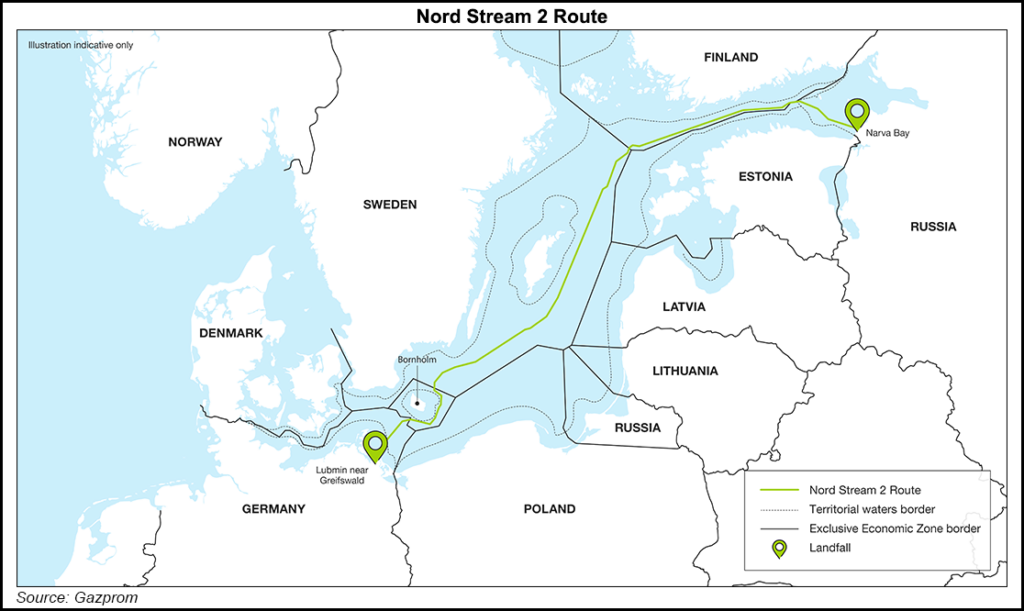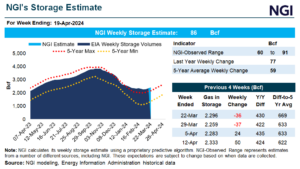LNG | LNG Insight | NGI The Weekly Gas Market Report
New Nord Stream Sanctions Draw Scrutiny, Stir Ire of Stakeholders
The Trump administration has unveiled a potentially quixotic effort to halt the controversial $11.4 billion Nord Stream 2 (NS2) natural gas pipeline from Russia to Germany by threatening to sanction companies that help complete the last 100 miles of the 745-mile line.

The State Department plans to alter the Countering America’s Adversaries Through Sanctions Act (CAATSA) to allow for sanctions to potentially be issued against companies that participate in NS2 from now on, Secretary Mike Pompeo said.
“It’s a clear warning to companies: aiding and abetting Russia’s malign influence projects will not be tolerated,” Pompeo said. “Get out now, or risk the consequences.”
The German government supports the 5.3 Bcf/d NS2 line, which it said would enhance European Union (EU) energy security by sending more Russian gas directly to Germany through the Baltic Sea. NSW would run from Ust-Luga, Russia, to Greifswald, Germany.The gas would be used in Germany and distributed throughout Europe, helping reduce Europe’s sometimes troubled reliance on Ukrainian pipeline transport to receive Russian gas. Ukraine and Russia have been involved in numerous disputes over transit fees and the gas siphoning from Ukrainian lines, sometimes significantly curtailing supplies to European customers on cold winter days.
Pompeo scoffed at the notion that NS2 would improve European energy security.
“Let me be clear,” he said. “These aren’t commercial projects. They are Kremlin’s key tools to exploit and expand European dependence on Russian energy supplies, tools that undermine Ukraine by cutting off gas transiting that critical democracy, a tool that ultimately undermines transatlantic security.”
NS2 spokesperson Jens Mueller told NGI that U.S. efforts to prevent the pipeline’s completion “reflect a clear disregard for the interests of European households and industries, who will pay billions more for gas if this pipeline is not built, and the European Union’s right to determine its own energy future. Decisions about European Union energy policy should be left to Europeans.”
Mueller said energy companies from Austria, Germany, France and the Netherlands have committed to invest almost 1 billion euros ($1.14 billon) in NS2, “and more than 1,000 companies from 25 countries are fully committed to seeing the project completed.”
U.S. sanctions would “directly hit” more than 12 companies from more than 12 European countries and block further investments of 700 million euros ($800 million) to complete the project, Mueller said.
The sanctions would undermine total investments of 12 billion euros ($13.7 billion) that have already been made in EU energy infrastructure, including 8 billion euros in NS2, 3 billion euros in downstream infrastructure in Germany and 750 million euros in the Czech Republic. The additional infrastructure has been built to send NS2 gas “throughout the European market,” Mueller said.
NS2 would double the capacity of Russian gas to Germany through the Baltic Sea, as it would run roughly along the same route as the existing 5.3 Bcf/d Nord Stream line. Russia’s Gazprom is the majority owner of both lines, but major European companies that have significant operations in the United States are stakeholders in NS2.
In September 2015, an NS2 stakeholders agreement was signed between Russia’s Gazprom, BASF Corp., E.ON SE, Engie, OMV and Royal Dutch Shell plc. Two years later, Engie, OMV, Shell, Uniper SE and Wintershall agreed to provide long-term financing for 50% of NS2, with Gazprom providing the rest.
Uniper spokesperson Oliver Roeder echoed the comments of NS2, telling NGI that with Pompeo’s announcement “the U.S. continues to aim to undermine an important infrastructure project that we believe is important for Europe’s energy security. This is a clear encroachment on European sovereignty. Germany and the EU have reassured the political support for NS2 given its role for security of supply.“
Wintershall and maritime Norwegian maritime classification society Det Norske Veritas (DNV), which is verifying the integrity of the pipeline system, told NGI the companies are monitoring developments.
NS2 was previously grandfathered from CAATSA, which was signed into law by President Trump in August 2017 to sanction Russia for its incursion into Ukraine and into Syria, its interference in the 2016 U.S. presidential election, as well as to sanction Iran and North Korea over nuclear development.
Until now, the law only applied to Russian energy export pipeline projects for which a contract was signed on or after Aug. 2, 2017. The change would also allow for potential sanctions against companies that participate in the second line of the Turkstream pipeline from Anapa, Russia, to Kikikoy, Turkey under the Black Sea, Pompeo said.
Pompeo’s announcement came after the Danish government earlier this month provided a crucial permit for pipe laying in its territorial waters, leading to widespread expectations that NS2 would be completed by next year. After it was evident that NS2 would be delayed by U.S. sanctions imposed on Baltic Sea pipe laying, Russia and Ukraine last winter agreed on a transit deal for about 6.3 Bcf/d in 2020 that would step down to about 3.9 Bcf/d in 2021-24.
Trump wants to sell more U.S. LNG to Europe, with Department of Energy officials in May 2019 calling U.S. LNG “molecules of U.S. freedom.” Pompeo said on July 15 that “the United States is always ready to help our European friends meet their energy needs.”
Questioning Trump’s Motives
Analysts at the Washington, DC.-based Atlantic Council, which has criticized the NS2 project, questioned whether the Trump administration intends to impose sanctions, as “sanctions alone are unlikely to fully stop” the completion of the pipeline.
“Odds are, however, that Secretary Pompeo’s announcement and the revised guidance are more messaging than a true indication of impending sanctions,” said Atlantic Council fellows Brian O’Toole and Daniel Fried on the think tank’s web site.
The Trump administration’s actual goals may be to delay the project beyond the November elections, they said, as well as delay or thwart the passage of mandatory sanctions against a wider number of NS2 participants, as part of the currently proposed National Defense Authorization Act.
Sen. Ted Cruz (R-TX), who is one of the sponsors of the proposed mandatory sanctions, said Pompeo’s announcement “confirms that there is a unified bipartisan, bicameral, inter-branch consensus across the whole of the United States government to ensure Putin’s pipeline never comes online.” However, he added that in the coming weeks Congress will consider expanding mandatory sanctions against NS2 participants because “the Kremlin will no doubt continue its frantic efforts to circumvent American sanctions.”
O’Toole and Fried said that the effect of the proposed sanctions “may be to pit the United States against its NATO ally Germany in a stand-off over the long-disputed project.” The revised guidance would protect companies from sanctions if they were winding down their involvement and still specifies that the administration will “coordinate with allies of the United States in imposing these sanctions.”
The proposed sanctions could target “any significant work” to advance the project as the investment threshold is low at $1 million for an individual transaction and $5 million in total over a year, they said.
They said potential harms to Europe from NS2 have been mitigated in recent years by the development of smaller pipelines that can move gas from Germany east to Central Europe and Ukraine, greater availability of LNG from the United States and other sources, and anti-monopoly provisions of the European Union’s (EU) Third Energy Package, which have substantially reduced Europe’s dependence on Russian gas.
© 2024 Natural Gas Intelligence. All rights reserved.
ISSN © 1532-1231 | ISSN © 1532-1266 |


